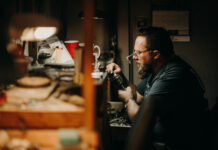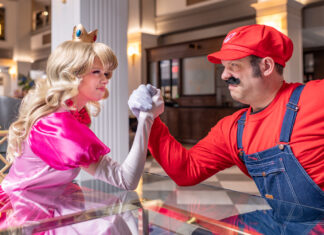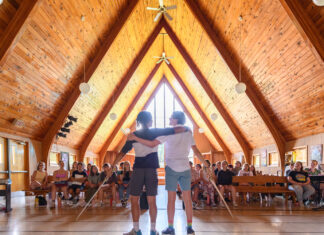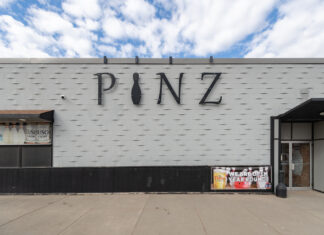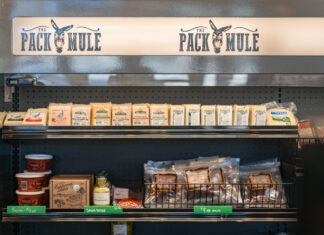By Austin Kaus
Jesse Christen knows how to play music. Whether it’s as a member of the 90’s punk band The Sneakies or his current gig playing jazz-rock fusion with Brain Masek, Christen is unafraid to tackle a musical challenge. He recently released his second album of guitar-driven instrumental tracks called Fixations. In his chat with Austin Kaus, Christen talks about his growth as a musician and why he doesn’t care much for the current state of pop music.
Tell me about making this record.
JC: It’s just a continuation of the last one (2013’s Gate of Charity). We just picked up kind of where the last one left off.
What’s your overall goal for this project?
JC: Expand myself artistically. I guess playing’s just what I do. It’s fun to be able to create stuff that’s your own. A painter paints on a canvas. My canvas is silence and I create these soundscapes and hope that somebody else will enjoy them too.
Is this a direct reaction to commercialism?
JC: Yeah. I’ve never been one who is into music from a commercial standpoint. I always seem to go against what the mainstream is at any point in my life or even the mainstream of the alternative world. It just seems like everybody, especially as you get older, everything is done to try to please the masses. I don’t think there’s probably enough people creating music to do something creative and to express themselves. Our popular music scene is so horrible right now. Hopefully, what I’m doing is a reaction to that. Even if you listen to pop music…even comparing disco, what dance music used to be compared to now. At least there used to be songs that had melodies and some kind of structure rather than a repetitive, short, and not even melodic idea that repeats itself over and over again. I guess we live in an age where someone becomes famous because someone says they’re famous. They don’t do anything. They don’t have any talent.
Is that the state of the current music scene or are you just getting old?
JC: Probably both.
Did you have any guilty pop music phases growing up?
JC: Being a little kid, I remember liking Hall & Oates or Rick Springfield. I was really young and that was what was on the radio at the time. I was pretty lucky. I grew up in a home that, for rural South Dakota, had a pretty impressive music collection, so I got to hear a lot of really great stuff young. My parents were kind of of the hippie generation.
What do you remember hearing on the turntable growing up?
JC: The thing that made me want to play guitar in the first place was hearing the Rolling Stones’s ‘Jumping Jack Flash.’ I was like six years old and that’s when I said ‘This is what I want to do. I want to sound like that.’ Keith Richards was my childhood hero.
Were your parents supportive of that?
JC: Yeah. They thought it was cool. My dad played saxophone. He played a lot of jazz. He always told me that he never liked rock and roll until he heard Hendrix. I heard a lot of stuff like that.
Are people buying your records?
JC: It’s by no means a lucrative career, but I think the new one’s ready to go aluminum. (laughs) I’ve moved over 100 copies. Every once in a while, it surprises me. When people buy my stuff on CDBaby, it’ll say the location they ordered it from. The one that weirded me out was someone in Chile randomly bought one. I thought it was kind of cool.
How many live shows do you play?
JC: With this band, we don’t play too often. We played a CD release gig. We probably played a half a dozen times maybe over the year. Between all the other stuff I do, it probably averages out to about once a week.
What other stuff are you doing?
JC: One of the cool things is I play in a Tommy Bolin tribute band at the Tommy Bolin Fest in Sioux City every year. I play solo…with an acoustic guitar, even! I play in restaurants and stuff around town. I have a new jazz rock project with Brian Masek in Sioux Falls.
You grew up in Huron. What’s your musical history?
JC: I started playing guitar when I was 12 years old. It was something I always wanted to do, but my parents made me take piano lessons. I played in school orchestra, but that all went by the wayside when I got my first BMX bike. I saved up with a paper route and started skipping music lessons. The bike switched to skateboards and the punk rock thing went along with that. Around the time I got into that stuff, there was an older kid across the street who had a guitar. He showed me how to play a couple of things. ‘Put this finger here, put this finger here and hit these two strings.’ I had played piano for several years and had a little bit of idea of music. I was able to take those very few ideas and move them around because I understood how chords worked. I was able to figure out what the notes on the neck of the guitar were really rapidly. I guess my parents were right. Piano lessons were good. I thought it was a terrible idea at the time, but it paid off in the end.
I took a few lessons when I was young and I always just kept laying. I always wanted to be in bands. In ninth grade, I started to play with people I knew from school. Being a kid in Huron, your options are limited. You might be able to play in the school variety show or in the park in the summer. I just always kept playing. In my older teens, I decided I wanted to actually learn something other than the hardcore punk and thrash metal stuff that I was into. I thought it would be cool to learn to play Cream songs. I found someone in Mitchell who gave lessons who was a little more advanced. That got me rolling in the music theory. After high school, I moved to Sioux Falls and had the punk rock band The Sneakies. After I left that, I went back to Huron for a while and played occasionally. I’ve played in variety bands that play street dance type gigs. I’ve played in hardcore blues bands. Lately, I’ve been doing gigs towards more of the jazz side of the world.
You cover a lot of ground.
JC: If you like music, you keep doing stuff.
Have you had offers of music you didn’t want to play?
JC: Oh yeah. The variety band stuff. I always thought I was too cool to play anything like that, but nobody wanted to start bands anymore so I didn’t have anything to play. I can do this and make a few bucks and play and have a good time. In the end, it was a good experience because it made me learn a whole bunch of tunes that I would’ve never learned before. I had to brush up my country chops.
How long were the Sneakies around?
JC: I think it was 1994 through 1997.
I think I’ve seen footage of you playing (the now-gone Sioux Falls bar/venue) The Pomp Room. How big a role did that place play in your life?
JC: That place was awesome! I remember the first time we played there was at an all ages show. The band for the night – after the all ages show – canceled. I was still pretty young at the time. I don’t think I was old enough to technically be in a bar. They told us they’d pay us $150 if we played again that night. ‘Wow, we’re getting $150 to play a gig! That’s awesome.’ We’d maybe make $50 a band on a good night.
I saw so many cool concerts at that place. It was fun. You got to play on a big stage. I got to know the guys who worked there. Matt Staab – who was in The Sneakies and is no longer with us – and myself were kind of bigger guys and we were good at carrying heavier stuff. The older guys that worked there like us and would have us help out with band load in and load outs. The coolest thing was after Cheap Trick played there one time, I helped them load out and I was one of two people who got to carry Rick Nielsen’s five-neck guitar.
On the latest record, there are definitely hints of punk rock that pop up on “Splittin’ The Sheets.”
JC: I won’t argue with you. I loved that. When I was young, I pretty much lived for punk rock. For a number of years, punk rock and skateboards were the only two things I cared about.
Is that a world you’re ever going to revisit?
JC: Ah, my knees can’t quite take the abuse. Probably my failing as a punk rocker was I was too musically ambitious.
That could piss off some punk rockers.
JC: I think part of the style of that music, what makes it cool, is that there’s a real tension that it could fall apart at any moment, that you’re just barely pulling it off. That’s kind of the energy of that music. I’ve already been there and done that. I still like stuff in that genre, like MC5 and Iggy Pop stuff. Even like early hardcore stuff like Black Flag or Circle Jerks, that’s the stuff that I’m still nostalgic for.
Any new year’s resolutions?
JC: Hopefully become a rich and famous musician so I can move where it’s warm! That probably won’t happen, so just keep playing music, make original music, play more gigs and continue to improve my craft. I’m in this for the long haul. I want to be playing when I’m 60+ years old.
You said this recent album is part of a series. Is that something you plan on continuing?
JC: Possibly. Everything’s kind of on hiatus right now. Hopefully, we’ll revisit it someday. Brian and I have a lot of gigs. I also have another project called Neon Knights after the Black Sabbath song. I like the older hard rock/heavy metal stuff. We’re doing those kind of tunes, which are fun to play.
If someone comes up to you and wants to start an Iggy Azalea cover band, are you down?
JC: (laughs) I don’t know who that is. If it was Iggy Pop, I already know quite a few of those.
Check out Christen’s new album Fixations here and find information on upcoming gigs on Facebook here.





